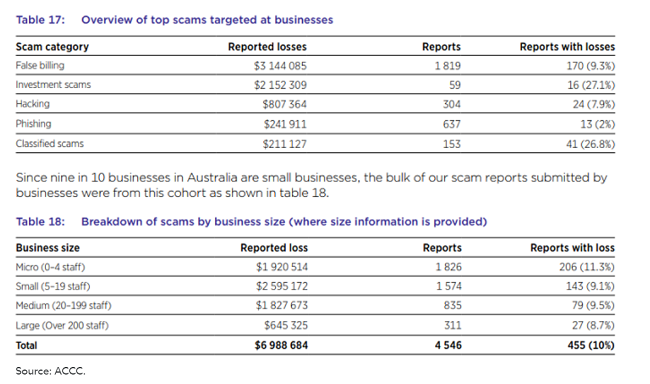Published on Jun 7, 2019
Feel free to share
The end of financial year (EOFY) is looming and that means…a new round of scams. As account departments and small business owners’ ramp up to finalise their EOFY accounts and compute their group certificates, cybercrime also increases.

According to the Australian Competition and Consumer Commission (ACCC) Australian business reported more than 5800 scams to them in 2018 with losses exceeding $7.2 million. This was up 58% from the previous year.
They said when data from Australian Cybercrime Online Reporting Network (ACORN) is included, businesses lost closer to $60 million. And when scams that target the general public are included, this figure increases to more than $489 million.
According to ACCC Deputy Chair Delia Rickard “These extraordinary losses show that scammers are causing significant financial and emotional harm to many Australians. Scammers are adapting old scams to new technology. They are seeking payment through unusual methods, and automating scam calls to increase their reach to potential victims.”
2019 ATO scams
This year alone the ACCC has posted alerts of three major scams purporting to be from the Australian Taxation Office (ATO). There was a ‘tax refund notification’ SMS scam in May, which attempted to have people provide identifying information by clicking on a link.
In April there was a phone scam, which threatened people with imprisonment for non-payment of taxes and requesting immediate payment in bitcoin or iTunes cards. And in March there was an email scam with a fake myGov tax refund notification. The ACCC also posted nine ATO related scams in 2018.
Who’s at risk?
Scammers were more likely to target small businesses with fewer than 20 staff. This account for more than 75 per cent of reports to the ACCC. Businesses were most likely to be targeted with false billing scams (1819 reports). But there were also significant losses through investment, hacking and phishing scams as well (see below).

How to protect yourself
It’s a good time of the year for a general security check, change all passwords and get two-step authentication. Be careful who you share personal and financial information with.
Visit www.scamwatch.gov.au to learn more about scams targeting businesses with information on how to protect yourself. Or follow @scamwatch_gov on Twitter and subscribe to Scamwatch radar alerts.
Businesses can also sign up to the ACCC’s Small Business Information Network to receive emails about new or updated resources, enforcement action, changes to Australia’s competition and consumer laws, events, surveys and scams relevant to the small business sector.
Go here to read an article on grants for a cyber health-check we published in April 2019.
Similar News View All Similar News
Topic:



